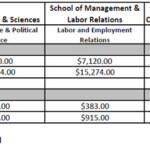Rutgers Transfer Credit Pre Approval Form Nursing – If you’re confused about the process of transferring then you should fill out your transfer request using the Transfer credit Acquired form, or TCAF. There may be a class which you failed to complete and haven’t been awarded a grade for but you’re wondering if you can use it for your degree. The good news is that you could. Most courses that score grades of C or better don’t require material review. However, you should note that courses that don’t transfer into a specific U.M. course will be considered departmental credits. If it’s not, then you won’t be able to transfer it to another U-M program and it could not be able to meet the requirements for a degree.
The coursework must be graded equivalent to an A or better
For your courses to be transferable to another institution, they must have been awarded the standard of C or better. To be eligible for credit transfer, they should be taken at an accredited institution which includes The Higher Learning Commission or the Middle States Association of Colleges and Schools (MASAC). International programs must be assessed in a way that is individual. Official transcripts should be submitted with the CCS. Your previous institution must also be able to accept the courses.
In order to transfer your credits from a old college, classes taken at a foreign institution must have been awarded a grade of C or higher. Graduations that pass or are satisfactory are not transferable, nor are colleges algebra, developmental courses, or career and technical courses. However the policy has been modified in the course of the COVID-19 pandemic, and any courses previously completed are now accepted.
For transfer credit, all courses that are taken at accredited regional institutions must have been awarded a grade or grade “C” or better in the previous institution. In order to transfer credits it is necessary that the courses be comparable in scope as well as their content. While a grade of C is generally the minimum standard for transferable credit some institutions do accept degrees of “D” or higher. Accreditation organizations comprise The Middle States Association of Colleges and Schools, the New England Association of Schools and Colleges and the Northwest Association of Schools and Colleges, and the Southern Association of School and Colleges.
TCEL includes courses that have transferred to Clemson before. This is not an exhaustive list . Courses not listed here must be evaluated prior to applying to Clemson. This TCEL listing also provides courses that are equivalent to other courses, however the list is not a reflection of the differences regarding credit hours between institutions. Furthermore, while TCEL lists courses that are comparable in terms of courses offered at different institutions, the Office of Admissions’ evaluations depend on the most current information.
Although your previous work could be acceptable, it is vital to revisit its academic consequences. If it is not possible to complete the necessary course work think about retaking it. Make sure that you get at the very least a “C” in the course and also meet any stipulations which are required by your university. If you take a course more than three times could affect your GPA cumulatively and should be taken into consideration when deciding to repeat it.





